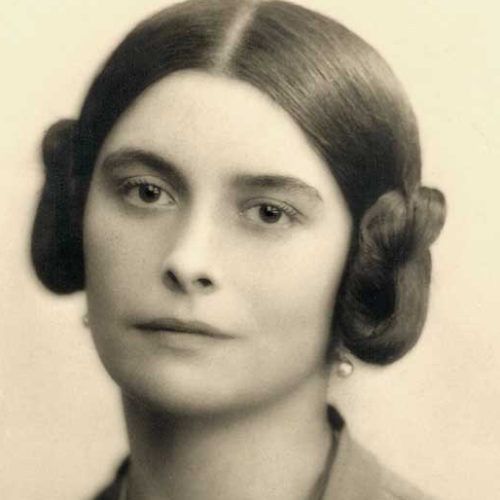
Sofka Skipworth was a Russian princess imprisoned by the Nazis who saved 51 Jews from the gas chamber.
Born Princess Sophia Dolgorouky in St. Petersburg in 1907, Sofka was the only child of Prince Peter Alexandrovitch Dolgorouky and Countess Sophy Bobrinsky. She was a direct descendant of Catherine the Great.
As a child, Sofka played with the children of the Romanov imperial family (later to be murdered by Bolsheviks), but she had a natural affinity for the poor and oppressed. After hearing from a family servant that peasants in Russia were starving, she stopped eating dessert and instead smuggled her cakes and pastries to poor children.
After the Russian Revolution, Sofka and her family became refugees, living in exile in England and France. She attended Queens College in London, then learned secretarial skills in both French and English. She worked a series of temp jobs, then became secretary to the Duchess of Hamilton, an animal-rights activist.
In 1931 Sofka married Leo Zinovieff, an engineer and fellow exiled Russian aristocrat, and they had two sons. Because of the Great Depression, Leo had difficulty finding work, and Sofka continued working as a temp secretary, and also started teaching Russian. Her students included famed actor Laurence Olivier and his wife.
Sofka and Leo divorced amicably, and the next year she married British pilot Grey Skipwith. She had a third son in January 1939. Soon after, World War II began, and her husband joined the Royal Air Force. In early May 1940, Sofka went to Paris for a visit to help her ailing mother. When the Germans marched into Paris on May 10 and occupied the city, Sofka was trapped. Along with other British nationals, Sofka was arrested and sent to an internment camp at Besancon, France, then transferred to another camp at Vittel. In Vittel, she learned that her husband’s plane had been shot down and he was dead.
In the internment camp, Sofka worked to improve conditions for the inmates. She organized cultural activities, including a popular camp library, and advocated for prisoner rights. Most notably, Sofka repeatedly tried to help other prisoners escape. She managed to stay in contact with French Resistance leaders, and smuggled messages to them about what was happening in the camp.
In 1943, a group of 250 Polish Jews arrived at Vittel. They all had papers certifying that they were South American, which should have protected them, but the Germans determined the documents were fake and arrested them. Sofka was shocked by their disturbing stories of anti-semitic persecution. She later recalled, “The thing that struck us about these newcomers was their air of sleep-walkers. They appeared dazed. They spoke little, never seemed to smile, walked slowly in the park, as though nervous of doing wrong.”
Sofka learned that the Jews were being held at Vittel temporarily before being shipped to Auschwitz, and she made it her mission to save them. She wrote the list of 250 names in tiny letters on delicate slips of cigarette paper, and sent multiple copies to her Resistance contacts in Geneva. She pleaded with them to find South American diplomats who would certify that the Jews were indeed South American citizens.
Sofka never received any response, and the Polish Jews were soon on a cattle car to Auschwitz. Before they left, Sofka managed to miraculously smuggle a swaddled Jewish baby under a camp fence to safety. She was devastated that she was unable to save the rest of the Jews from the gas chambers of Auschwitz.
Forty-two years later, in 1985, Sofka learned that because of the list of names she’d sent to Geneva, fifty Jews were taken off the train headed for Auschwitz. They were exchanged for German POW’s, and sent to Palestine. Sofka spent decades thinking she’d saved the life of one Jew, when in fact she saved 51!
In August 1944, Sofka was released and sent back to England. She could have gotten out sooner, but chose to stay in the camp to continue helping other inmates. After the war, Sofka became a human rights activist and a Holocaust educator. She died of heart failure in 1994. Four years later, Sofka Skipwith was posthumously honored as Righteous Among the Nations by Israeli Holocaust Memorial Yad Vashem. In 2010, Sofka was one of 25 people to be posthumously honored by the United Kingdom as a British Hero of the Holocaust.
For saving Jewish lives even while imprisoned by the Nazis, we honor Sofka Skipwith as this week’s Thursday Hero.
Get the best of Accidental Talmudist in your inbox: sign up for our weekly newsletter.